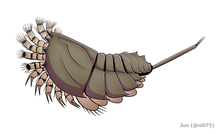Offacolus
| Offacolus Temporal range: Homerian, ~
| |
|---|---|

| |
| Reconstruction of Offacolus kingi | |
| Scientific classification | |
| Domain: | Eukaryota |
| Kingdom: | Animalia |
| Phylum: | Arthropoda |
| Subphylum: | Chelicerata |
| Clade: | Euchelicerata |
| Family: | †Offacolidae Sutton et al., 2002 |
| Genus: | †Offacolus Orr et al., 2000 |
| Type species | |
| †Offacolus kingi Orr et al., 2000
| |
Offacolus is an extinct genus of euchelicerate, a group of chelicerate arthropods. Its only species, O. kingi, has been found in deposits from the Silurian period (Homerian epoch) in the Wenlock Series Lagerstätte of Herefordshire, England. The genus is named after Offa, a king from the ancient kingdom of Mercia, and colus, a person who dwelled among (this time referring to) the Offa's Dyke. The species name honors Robert Joseph King, a British mineralogist who found the fossils of Offacolus.[1]

Similar to Dibasterium, Offacolus possess limb-like exopods (outer limb branches) on appendage II to V,[2][3] a character suggest to be plesiomorphic (observable in the putative stem-chelicerate taxon Habeliida[4]) and lost within the prosomapod clade.[5]
Classification
[edit]Offacolus was originally described as an arthropod with chelicerate affinities,[1] with detailed redescription done by Sutton et al. 2002 further suggested it to be unambiguously a chelicerate arthropod.[2]
A phylogenetic analysis (the results presented in a cladogram below) conducted by James Lamsdell in 2013 on the relationships within the Xiphosura and the relations to other closely related groups concluded that the Xiphosura, as presently understood, was paraphyletic (a group sharing a last common ancestor but not including all descendants of this ancestor) and thus not a valid phylogenetic group. Offacolus was recovered as the sister taxon (closest relative) of Prosomapoda.[5]
O. kingi was once considered the only mamber of the monotypic family Offacolidae. This family currently includes along with O. kingi, Dibasterium and Setapedites and represent the sister group of Prosomapoda.[6]
References
[edit]- ^ a b Orr, Patrick J.; Siveter, Derek J.; Briggs, Derek E. G.; Siveter, David J.; Sutton, Mark D. (2000). "A new arthropod from the Silurian Konservat–Lagerstätte of Herefordshire, UK". Proceedings of the Royal Society of London. Series B: Biological Sciences. 267 (1452): 1497–1504. doi:10.1098/rspb.2000.1170. ISSN 1471-2954. PMC 1690702. PMID 11007324.
- ^ a b Sutton, Mark D.; Briggs, Derek E. G.; Siveter, David J.; Siveter, Derek J.; Orr, Patrick J. (2002-06-22). "The arthropod Offacolus kingi (Chelicerata) from the Silurian of Herefordshire, England: computer based morphological reconstructions and phylogenetic affinities". Proceedings of the Royal Society of London. Series B: Biological Sciences. 269 (1497): 1195–1203. doi:10.1098/rspb.2002.1986. PMC 1691018. PMID 12065034.
- ^ Dunlop, Jason A.; Lamsdell, James C. (2017). "Segmentation and tagmosis in Chelicerata". Arthropod Structure & Development. 46 (3): 395–418. Bibcode:2017ArtSD..46..395D. doi:10.1016/j.asd.2016.05.002. ISSN 1467-8039. PMID 27240897.
- ^ Aria, Cédric; Caron, Jean-Bernard (2017-12-21). "Mandibulate convergence in an armoured Cambrian stem chelicerate". BMC Evolutionary Biology. 17 (1): 261. Bibcode:2017BMCEE..17..261A. doi:10.1186/s12862-017-1088-7. ISSN 1471-2148. PMC 5738823. PMID 29262772.
- ^ a b Lamsdell, James C. (2012). "Revised systematics of Palaeozoic 'horseshoe crabs' and the myth of monophyletic Xiphosura". Zoological Journal of the Linnean Society. 167 (1): 1–27. doi:10.1111/j.1096-3642.2012.00874.x. ISSN 0024-4082.
- ^ Lustri, Lorenzo; Gueriau, Pierre; Daley, Allison C. (7 May 2024). "Lower Ordovician synziphosurine reveals early euchelicerate diversity and evolution". Nature Communications. 15 (1): 3808. Bibcode:2024NatCo..15.3808L. doi:10.1038/s41467-024-48013-w. PMC 11076625. PMID 38714651.
